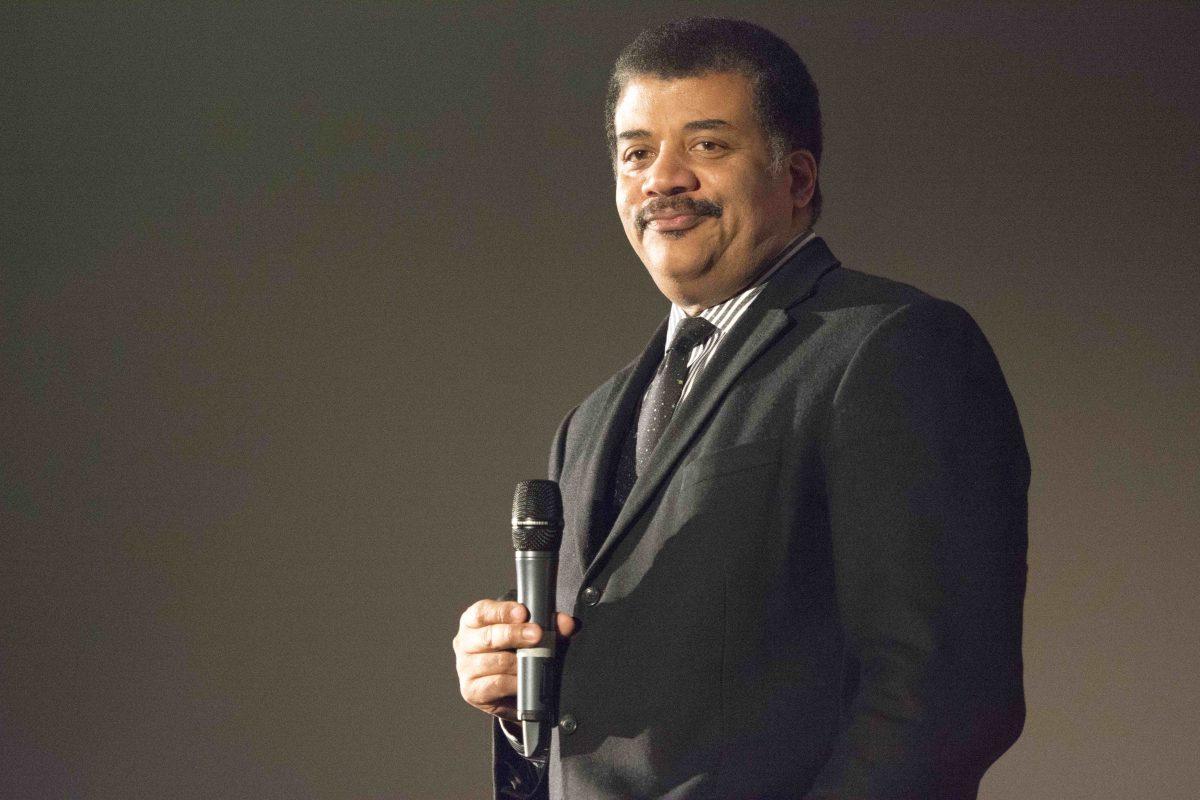Neil deGrasse Tyson, an astrophysicist, author and host of Cosmos: A Spacetime Odyssey, used his wit and charisma to humor a sold-out crowd at James B. Hunt Library while also explaining how anti-science attitudes could be detrimental to the culture and economy of the United States.
Tyson’s lecture, Adventures in Science Literacy, took place Wednesday for N.C. State’s State of Sciences signature event and explored the implications of scientific ignorance and a lack of interest in the sciences.
Tyson described science literacy as not only being knowledgeable about a scientific subject but also the capacity to ask questions and to question a lack of evidence in general.
“Science literacy isn’t knowing about a DNA molecule or the big bang or how a combustion engine works—that’s an aspect of it—but for me, science literacy is ‘what is your capacity to ask questions?’” Tyson said. Questions are kind of an inoculation against people telling you stuff and having you believe whatever they say.”
In regard to the importance of evidence and asking questions, he asked, “where is the United States?” in terms of promoting and accepting scientific data. He then showed an international survey where countries were ranked based on how many of its citizens believed humans evolved from other species. The U.S. ranked toward the bottom.
“We live in a free country, so there’s no law against believing whatever you want; it just has consequences,” Tyson said. “You can’t just say ‘this is cool and everything’s fine with [the survey results]’, and then complain that our economy is failing. So if you want to think whatever you want, and say it’s science, and let that be the world you want to live in, recognize the cost of that.”
One of those consequences is a lack of appreciation for science compared to other developed nations. For example, Tyson showed European and Asian currencies that featured scientific figures such as Isaac Newton, Nikola Tesla and Albert Einstein. However, the only scientist featured on a U.S. bank note is Benjamin Franklin on the $100 bill, which has no other scientific references.
To explain this point, Tyson showed a world map that compared the size of countries based on how much scientific research was conducted; the U.S., Europe and Japan were by far the largest.
“But it turns out, this is not the map you should be looking at,” Tyson said.
He then projected a map showing how much research countries conducted compared to 10 years ago, which showed a significantly smaller version of the U.S.
“We’re fading and we’re fading fast,” Tyson said. “Europe is even bigger, Japan is even bigger, China is even bigger. You want the three economies of tomorrow? It’s Europe, China and Japan.”
Tyson said a lack of scientific understanding leads to an unwillingness to solve difficult problems. For example, he showed the audience an article where people were asked to describe what they would do if a giant asteroid hit earth. Most of the responses involved getting drunk and enjoying their last days on Earth.
“My concern is not that people feel this way—being honest and a little playful—but that no one said ‘I’d try and find a way to deflect it,’” Tyson said. What world is this that we run away from challenges that we have the intellectual capacity to solve?”
Tyson also used historical examples to explain how cultures that were once at the apex of scientific and mathematical discovery, aren’t as significant today.
According to Tyson, the Arab world was a thriving center for medicine, engineering, math and science during a time when “Europe was disemboweling heretics.”
However, that enlightened period came to an end when certain philosophies “went unchallenged and unchecked.”
“Anything that happened was interpreted as the will of God,” Tyson said. “All natural phenomenon were interpreted in that phrasing. If that’s your account of that natural world, you’ve stopped asking questions about why.”
Because of this way of thinking, Tyson said only two Muslims, out of the 1.4 billion in the world today, have won the Nobel Prize for science, while Jews, who have a world population of less than 20 million, have accounted for almost a quarter of Nobel Prizes.
“Had Islam continued from what they were doing a thousand years ago, they’d have all the Nobel Prizes,” Tyson said. “Whenever I go to sleep at night, I think about how many more discoveries would be around us had that period of discovery continued to this day.”
Tyson also explained how people “who don’t like the science” replace scientific explanations for natural phenomenon with religion.
For example, a picture of a bumper sticker that read, “Big Band Theory: God spoke and “bang,” it happened.
“People are voting for what they want to be true in the world,” Tyson said. “But of course science doesn’t work that way. What is true with science is true whether or not you believe in it. At some point people have to recognize that, if you want sensible, rational governance.”








